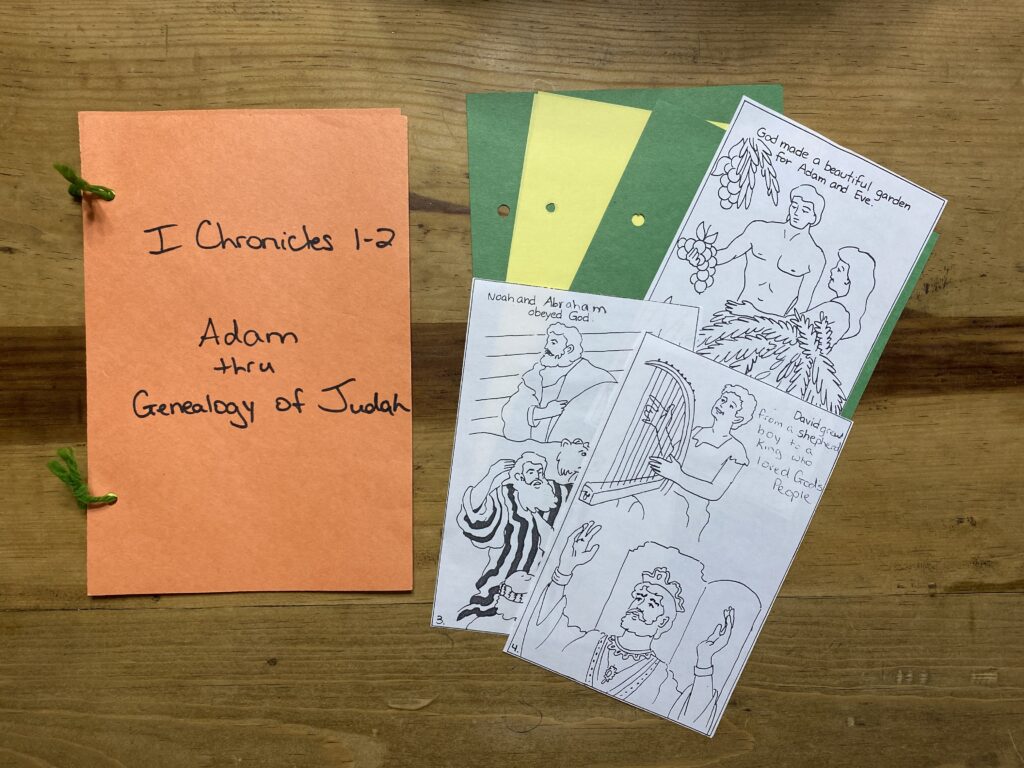
Key Verse
“Finally, my brethren, rejoice in the Lord. To write the same things to you, to me indeed is not grievous, but for you it is safe.”
—Philippians 3:1
Key Verse Thought: Read today’s key verse. In this lesson, we will remember many people we have studied before – ones we cannot forget!
Emphasis: We are to never tire of remembering God’s people, and what He did for them (and does for us today)!
Lesson Summary: It is important, upon occasion, to take a minute and stop to remember. In this lesson, as we begin the book of 1 Chronicles, we can see it begins with the genealogy from Adam – which is basically a time of remembering back to what God had done. Oftentimes we find the genealogies mundane and boring. As we go through the first chapter of 1 Chronicles, try to see the genealogy from a different perspective. It can be fascinating if you are able to recognize names, which in turn causes a remembering of great events in history. Be encouraged to look at genealogies from this perspective. Now that we have studied many great men and women in history, we should be able to read through these genealogies with much fascination.
One important reason that the books of the Chronicles were kept was to accurately record the lineage of the Israelites – to reveal to mankind with great assurance that Jesus was the rightful heir to the throne of David.
In our last quarter, we focused on the kings of Israel, the Northern Kingdom. As we continue our study, we will focus on the kings of Judah, the Southern Kingdom. In these lessons, we will look at the books of 1 Kings and 2 Kings along with the additional information about events and people that was not recorded in the records of the kings but in the books of 1 Chronicles and 2 Chronicles. These bits of information will be helpful in better understanding some events. The books of the Chronicles help us consider the spiritual significance of these events. First Chronicles begins with Adam and brings us to the kings of Judah. Especially notice the same struggle mankind has fought since the beginning of time: man’s choice. The choice is whether to obey God, or to choose not to obey God. The choice one makes determines one’s standing with God. See an example of man’s disobedience and obedience as recorded in First Chronicles:
1. Disobedience brought defeat and destruction: “13. So Saul died for his transgression which he committed against the LORD, even against the word of the LORD, which he kept not, and also for asking counsel of one that had a familiar spirit, to enquire of it; 14. And enquired not of the LORD: therefore he slew him, and turned the kingdom unto David the son of Jesse” (1 Chronicles 10:13-14).
2. Obedience brought peace and God’s blessing: “12. And they entered into a covenant to seek the LORD God of their fathers with all their heart and with all their soul; 13. That whosoever would not seek the LORD God of Israel should be put to death, whether small or great, whether man or woman. 14. And they sware unto the LORD with a loud voice, and with shouting, and with trumpets, and with cornets. 15. And all Judah rejoiced at the oath: for they had sworn with all their heart, and sought him with their whole desire; and he was found of them: and the LORD gave them rest round about” (1 Chronicles 15:12-15).
As we have learned and will continue to discover, faith in God, repentance, and seeking God with the whole heart (obedience) – not necessarily one’s genealogy – will determine one’s standing with God.
If you are teaching this to children and would like a craft idea to go with the lesson, see the following:

Leave a Reply